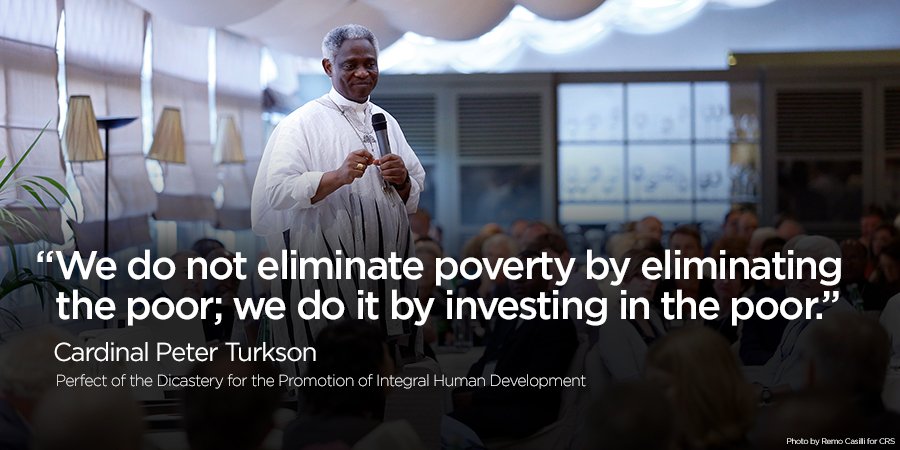Rome, July 9 — They caught my eye as soon as I entered the hall for the Third Vatican Conference on Impact Investing, sitting in the third row and wearing light blue habits. At your typical financial conference, you don’t find nuns and bishops among the fund managers, investors and analysts.
The sisters from the Association of Consecrated Women of Eastern and Central Africa spend most of their days serving people living on as little as a dollar a day. This week, they’re taking notes, from the start of the first session to the end of the last. The nuns want to become the entrepreneurs who can help the people they work with get on their own two feet. They have resources, such as land to farm, but they need business training.

Sister Eneless Chimbali
“The Sisters are always there. NGOs come and go. Investors come and go. But the Sisters remain. We need skills and expertise to sustain our ministries,” said Sister Eneless Chimbali, who represented the association on one of Monday’s panels. “Come help us sustain our congregation.”
This year’s Vatican conference is focused squarely on ways impact investing can serve the poor, and even the poorest of the poor. Even within impact investing circles, such customers are still often regarded as charity cases that can’t support viable businesses.
Cardinal Peter Turkson, who leads the new Dicastery for Promoting Integral Human Development, which with Catholic Relief Services is co-hosting the conference, said the conference had been organized to “look at very specific paths we can follow to increase capital used for impact investing, especially for the most poor and vulnerable among us, seeking commitments from all participants.”
"It's time to transition beyond grants and aid to sustainable sources of financing, which is what impact investing is capable of rendering." – @CardinalTurkson #VIIC2018 #ImpInv #FaithCapital #WithRefugees
— John Kluge (@klugesan) July 8, 2018
The Catholic Church has embraced impact investing as a way to broaden its mission. The Vatican Bank’s latest annual report touted the achievement of selecting investments that are consistent with Catholic ethics, such as the “respect of human life, creation and human dignity” as well as seeking to contribute to the “care of the common home,” as expressed in Pope Francis’s environmental encyclical, Laudato Si.’
At the conference, mornings begin with a prayer, and a sister leads the attendees in singing Amazing Grace before dinner. Sessions focused on impact investments that create jobs for youth, access to healthcare and support for migrant and refugee entrepreneurs.
Sr. Carol Keehan CEO of @TheCHAUSA kicking off a panel on impact investing for sustainable and universal healthcare for the poor. Sr Donna Markham CEO of @CCharitiesUSA working closely with CHA on this issue in the US. #VIIC2018 #socialdeterminants #healthcare pic.twitter.com/tTj5tD6xyp
— Matt Zieger (@mattzieger) July 9, 2018
Even the requisite acknowledgments that philanthropy is not enough to solve today’s enormous challenges are biblical. “It’s better to teach the poor to fish than give them fish,” Bishop Lucius Ugorji, who represents the Regional Episcopal Conference of West Africa, said Monday.
Sean Callahan, head of Catholic Relief Services, said in a statement, “Among the poorest of the poor, we constantly find inventive and resilient entrepreneurs and business-minded people who are eager to escape poverty, if only they had the capital to start businesses.”
Of course, it’s very difficult to make market-rate returns selling products to people living on a dollar or two dollars a day. In contrast, entrepreneurs marketing goods and services to the emerging middle class can produce healthy returns for investors, as returns do increase as you move up the economic pyramid.
"30 years from now, it will not be acceptable to make money for the sake of it without understanding the consequences of it. We need to change the flows of capital in the system." Reflection by Sir Ronald Cohen with @CatholicRelief, #VIIC2018. pic.twitter.com/qwh8Y0LBHT
— Michele G. Gilfillan (@mggilfillan) July 8, 2018
But investment returns are not the church’s top priority. At the first Vatican conference on impact investing, in 2014, Pope Francis said, “It is important that ethics once again play its due part in the world of finance and that markets serve the interests of peoples and the common good of humanity.” He called on Christians to rediscover the “precious and primordial unity between profit and solidarity.”
“We are at the grassroots all the time,” one a bishop from Nigeria said Monday. “We meet the people who are in a pinch. We are the ones they see. When they need clean water or electricity for their house or they have no house, they come to us. They can’t go to the government. We are the people they come to when they are in crisis.”











